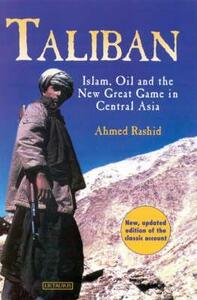Take a photo of a barcode or cover
informative
reflective
medium-paced
Although written more than 20 years ago, this book remains very accurate to this day in understanding what the Taliban are, where they came from, and what's driving them. But as the sub-title indicates, author Ahmed Rashid weaves the history of the Taliban into the history of the Central Asia region because the Taliban doesn't exist in a vaccum and in fact Rashid demonstrates clearly the interplay between Afghanistan, Pakistan, the Central Asian former Soviet republics, the Middle East and the US.
For me, the top 3 important points this book makes are:
1) The Taliban wouldn't have emerged if the civil war following the withdrawal of the Soviet Union from Afghanistant in 1989 didn't happen. They are a nasty, extremist by-product of that civil war.
2) The ideology of the Taliban is entirely foreign to Afghanistan. Historically, the Islam of the various ethnicities that make up Afghanistan has always been far more moderate.
3) It is probable that the Taliban wouldn't have succeeded and wouldn't have had any staying power if not for the significant help and active support from Pakistan, most especially its notorious secret services, the ISI. Pakistan bears a large responsibility for the ongoing mess since the 90s in Afghanistan, because it's been obsessed messing into Afghanistan because of this concept of using the Afghan space as "strategic depth" due to the limited geography of Pakistan in front of its nemesis India. What's crazy is that for Pakistan, supporting the Taliban and their extremist ideology has had tremendous negative consequences on Pakistan's economy, politics and social stability. The extremism of Taliban has spilled over into Pakistan, and still do to this day.
For me, the top 3 important points this book makes are:
1) The Taliban wouldn't have emerged if the civil war following the withdrawal of the Soviet Union from Afghanistant in 1989 didn't happen. They are a nasty, extremist by-product of that civil war.
2) The ideology of the Taliban is entirely foreign to Afghanistan. Historically, the Islam of the various ethnicities that make up Afghanistan has always been far more moderate.
3) It is probable that the Taliban wouldn't have succeeded and wouldn't have had any staying power if not for the significant help and active support from Pakistan, most especially its notorious secret services, the ISI. Pakistan bears a large responsibility for the ongoing mess since the 90s in Afghanistan, because it's been obsessed messing into Afghanistan because of this concept of using the Afghan space as "strategic depth" due to the limited geography of Pakistan in front of its nemesis India. What's crazy is that for Pakistan, supporting the Taliban and their extremist ideology has had tremendous negative consequences on Pakistan's economy, politics and social stability. The extremism of Taliban has spilled over into Pakistan, and still do to this day.
adventurous
challenging
dark
informative
reflective
tense
medium-paced
Fascinating. I could not put this book down and would consider it a must read for anyone who has an interest as to the rise of the Taliban and the consequences of the actions of the super powers.
On re-reading the book after nearly 20 years, I realise that I had been unfairly critical of it in the. It is actually a really good work of reportage. Anything that it lacks in depth it makes up for in the sweep of its historical and political scope. Smart analysis which has been mostly borne out by the years since.
informative
reflective
slow-paced
Ahmed Rashid starts the book with a brief history of Afganistan and further explains the rise of the Taliban. This book perfectly encompasses the social, economical, political, and religious factors that made Taliban a threat to its nation and the world.
The plight of a disturbed state and people, devoid of basic human rights, crippled with poverty is disturbing to read but provides an insight into human's ability to commit atrocity under the umbrella of religion.
Taliban started as a savior for the people of Kandahar from the corrupt Mujahideen leaders but ironically they became what they were fighting against.
It will be an interesting read for people who are curious about geopolitics, religion, ethnic diversity and social conditions of Afganistan after the defeat of the Soviet Union in 1989.
The New edition also includes the events that followed 9/11 and how the United States changed its foreign policies and urged Pakistan to stop supporting the Taliban. This part also covers the impact of Taliban in neighbouring countries like Pakistan, Turkmenistan, and Uzbekistan (2000-2009).
I admire the courage of Ahmed Rashid, who interviewed various leaders of the Taliban and the Anti-Taliban alliance amidst the chaos, packed with violence and fear. The book is an honest and truthful description of the brutal events that took place.
The plight of a disturbed state and people, devoid of basic human rights, crippled with poverty is disturbing to read but provides an insight into human's ability to commit atrocity under the umbrella of religion.
Taliban started as a savior for the people of Kandahar from the corrupt Mujahideen leaders but ironically they became what they were fighting against.
It will be an interesting read for people who are curious about geopolitics, religion, ethnic diversity and social conditions of Afganistan after the defeat of the Soviet Union in 1989.
The New edition also includes the events that followed 9/11 and how the United States changed its foreign policies and urged Pakistan to stop supporting the Taliban. This part also covers the impact of Taliban in neighbouring countries like Pakistan, Turkmenistan, and Uzbekistan (2000-2009).
I admire the courage of Ahmed Rashid, who interviewed various leaders of the Taliban and the Anti-Taliban alliance amidst the chaos, packed with violence and fear. The book is an honest and truthful description of the brutal events that took place.
challenging
informative
slow-paced
informative
reflective
slow-paced
What is remarkable about this book is that it was published 6 months BEFORE Sept 11,2011...and it couldn't be missed when the author states that the USA "had a plan for Osama Bin Laden but not a plan for Afghanistan".
Ah wrong-o! Apparently the US didn't even get that right.
Still, the material is great for historical knowledge and written by non-US citizen so there's less slant.
Ah wrong-o! Apparently the US didn't even get that right.
Still, the material is great for historical knowledge and written by non-US citizen so there's less slant.





